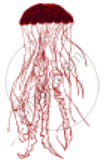Advertisements
Advertisements
प्रश्न
Give scientific reason.
Our body irritates if it comes in contact with a jellyfish.
उत्तर
- The mouth of jellyfish is surrounded by tentacles.
- The tentacles possess cnidoblasts which are used for capturing prey or for defense.
- When our body comes in contact with the tentacles of jellyfish, these cnidoblasts penetrate our skin as a defensive action.
- Cnidoblast injects the toxin in our body and thus, our body irritates if it comes in contact with jellyfish.
APPEARS IN
संबंधित प्रश्न
Identify me.
I am diploblastic & acoelomate. Which phylum do I belong to?
Give scientific reason .
Our body irritates if it comes in contact with jelly fish.
Label the following.

How does the animal in the figure protect itself?

How do we destroy the harmful insects?
State whether true or false. If false, correct the statement.
Canal system is seen in coelenterates.
Match the following.
| PHYLUM | EXAMPLES | ||
| (A) | Coelenterata | (i) | Snail |
| (B) | Platyhelminthes | (ii) | Starfish |
| (C) | Echinodermata | (iii) | Tapeworm |
| (D) | Mollusca | (iv) | Hydra |
Why coelenterates are called diploblastic animals?
Real organs are absent in
Define the terms and give one example
Coelom
______ are diploblastic.
Name the following:
A phylum with diploblastic animals.
How is the body wall of coelenterates arranged?
What is polymorphism?
Alternation of generations in Coelenterata is known as
Which of the following traits is not shared by both sea anemones and jelly fish?
Provide appropriate technical term in the space provided.
Stinging organ of jelly fishes ______.
Match the following:
| Animals | Locomotory Organ |
| a. Octopus | i. Limbs |
| b. Crocodile | ii. Comb plates |
| c. Catla | iii. Tentacles |
| d. Ctenoplana | iv. Fins |
